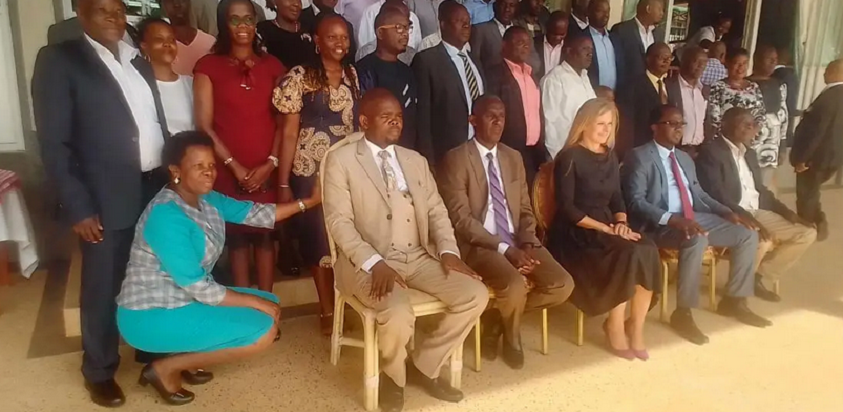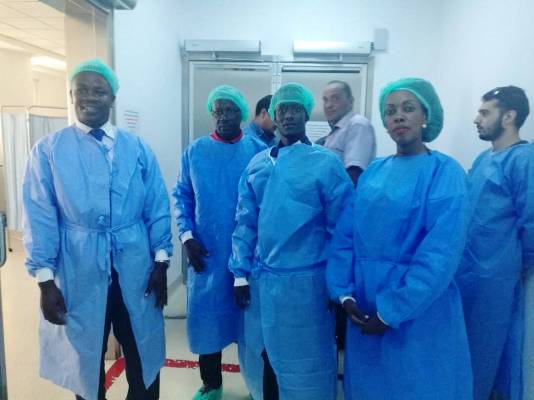Front row – Human Rights Commissioner Crispy Kaheru (2nd R), OHCHR deputy Redient Representative (C) and ISO legal director Churchhill (2nd L) Tutayomba pose for a pic with the officers.
Discussions continue between the United Nations- Office of the High Commissioner for Human Rights to persuade the Government to rescind its decision to close its activities in Uganda, deputy resident representative in Uganda, Ms. Grace Pelly has revealed.
About a week ago, the government through a statement by the Ministry of Foreign Affairs announced that the mandate of the OCHCR, which ends in March this year would not be renewed because the government and local institutions had developed the capacity to monitor, promote and protect human rights without external support.
The announcement drew strong criticism from human rights activists and civil society, saying that it was a sign of the times since the government is increasingly coming under the spotlight over abuses, including torture, forced disappearances, abductions, detentions without trial and re-arrest of persons legally released by the courts.
But addressing officers from the Internal Security Organisation at a four-day human rights workshop at Imperial Botanical Beach Hotel, Entebbe Tuesday, Pelly disclosed that the office would like to continue operations in Uganda and talks were going on at the highest level.
Pelly, whose office jointly hosted the workshop together with the Uganda Human Rights Commission explained that the Uganda Constitution 1995 Article 20(2) from which ISO derives its mandate imposed on the organization a duty to uphold the inherent dignity and equal rights of all persons, saying that it is that fulfillment that can “promote sustainable development, secure peace, and dignity of lives.”
UHRC member Crispy Kaheru, who represented the chairperson, Hajati Mariam Wangadya said the workshop was not in any way a response to transgressions but was part of the series of planned training activities of the commission started way back in 2020 but were cut short by the COVID-19 pandemic.
Running under the theme “Strengthening the Internal Security Organization personnel’s capacities for the respect of human rights for all,” and running up to Friday, the workshop attracted about fifty officers at the national level but Kaheru explained that others of the kind at the regional levels would be organized in the continuing effort and mandate of the commission. He expressed hope that training would result in the reduction of complaints against the (ISO) outfit, though the training was intended to apportion blame.
Pelly emphasized, “Professionalism in the ISO work if you truly respect human rights in carrying out intelligence duties. Failure to do so will undermine both the integrity of the intelligence work conducted and have a negative impact on the public’s trust in the Internal Security Organisation as a vital government institution of the state.”
She underscored the need to deepen understanding of the principles and practice of human rights to enable the institution to remain transparent and accountable to the population. She commended the “strategic partnership with the Uganda Human Rights Commission and the ISO in support and upholding of human rights” and “looked forward to enhancing the collaboration.”
Kaheru on his part said in the opening remarks that OHCHR, UHRC, and ISO should be scoring the same goal, securing all Ugandans. In his remarks the ISO Director for Legal Affairs Lt. Col. Churchill Tutayomba made a veiled attack on OHCHR and UHRC, saying they tend to advocate for the rights of the minority against those of the majority when they overlook the dangers of the activities of the people found culpable of engaging in grave crimes.
He defended his men saying that no one is trained to abuse rights but the operational nature of their work was a tricky one. He appealed to UHRC and OCHRC to advocate for better facilitation and equipping of ISO because at times ill facilitation and equipment are part of the problem. He said this was the reason often their evidence is rejected in court, citing abuse of the rights of suspects.
-URN





